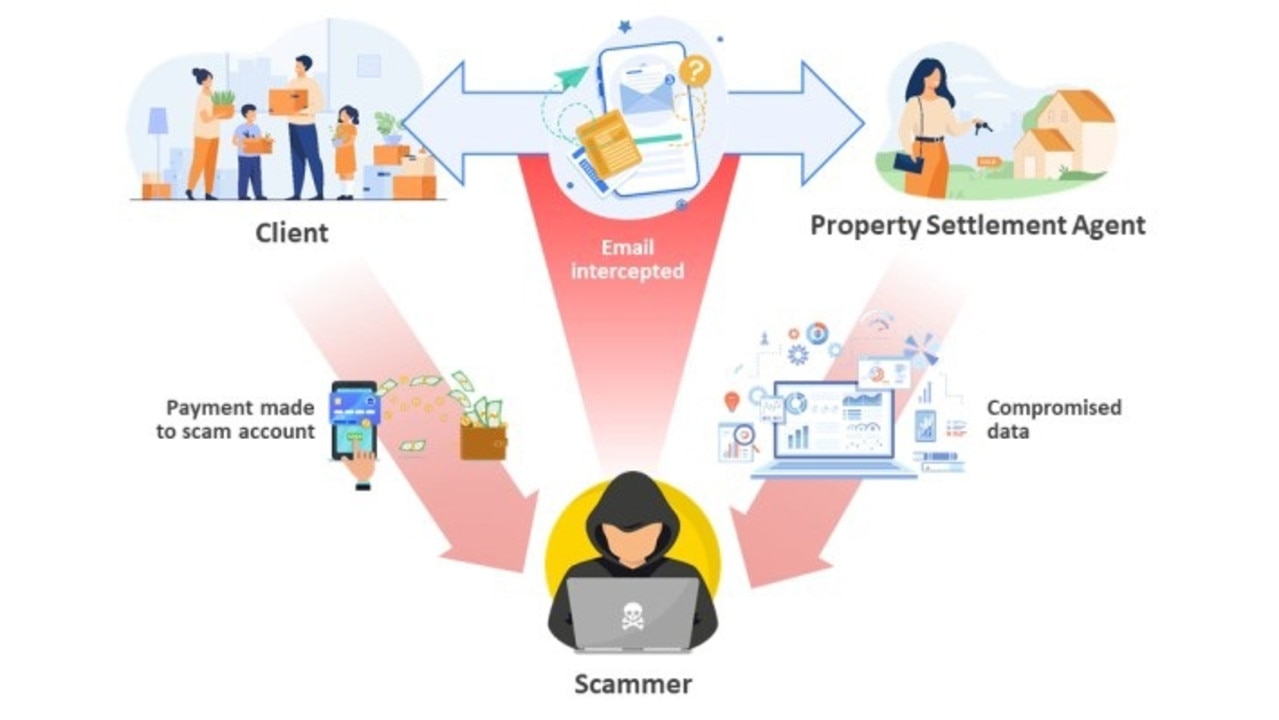‘Prime targets’: How blogger Constance Hall’s savings were ‘wiped out’ by sophisticated property scam
Mummy blogger Constance Hall had her savings “wiped out” when she fell victim to a sophisticated trick – here’s how it works.
Perth blogger Constance Hall says her savings were “wiped out” after she fell victim to a sophisticated property scam – and authorities warn renters are a “prime target” in a tight market.
Hall revealed to her 1.3 million followers on Wednesday that she “felt stupid” and was “devastated” after she paid money through an email link to what she thought was a real estate agency to secure a rental property for her and her children, only for the recipient to be a fraudster.
Known as a payment redirection scam, it involves email accounts being hacked or cloned, followed by requests for money.
“The scam particularly targets victims who may be expecting a message like this and are less likely to question it,” WA ScamNet says.
“Payment redirection takes place when scammers change the bank account so the money ends up being transferred into the wrong account. Property transactions are prime targets for this scam due to the often large amounts of money involved.”
Stream the news you want, when you want with Flash. 25+ news channels in 1 place. New to Flash? Try 1 month free. Offer ends 31 October, 2022 >

‘At first I felt stupid’
Taking to Facebook to explain her predicament, Hall said the bank had managed to recover a mere $7.57 of the thousands of dollars she paid out. “Officially the worst school holidays ever,” she wrote.
“At first I felt stupid, how could I let that happen? But I am a business woman, I pay large sums internationally often, I’m scam savvy and don’t pay anything that hasn’t come from a known contact with a credible email history, so no I’m not stupid. This could have literally happened to anyone desperate to get a rental.”
Hall said it was “all too much to take in” and the letting agent said “there was nothing that could do” and to call her bank.
The bank said as she had authorised the transaction the likelihood of getting any money back was “minimal” and to contact the police, who said much the same thing.
“Today the fraud department of Commonwealth Bank got back to me and told me that out of the thousands that I transferred they were able to recover $7.57 and that’s that. All my savings wiped out,” she said.
“The kids are devastated, we’ve had a s*** holiday coz mum’s broke and can’t even apply for more.”
She stressed it was “by no means a pity party, I’m in a better financial position than many, many people and for that I remain grateful and have to keep perspective”.
“But saving has never been easy for me and I was so proud of that money and felt like I was finally doing something that represented how well I have done despite all the odds,” she said.
“To have it all stolen in an instant … felt unbelievably unfair and it made me think about other single mums, mums who don’t have their mum to rely on or the career that this following has blessed me with.”

How does the scam work?
The people behind the scam hack into email accounts and get information about financial transactions underway between sellers or buyers and real estate or settlement agents.
“The scammers may appear to take control of the business’ email address or create a new, almost identical, email address that is difficult to distinguish from the original,” WA ScamNet says.
“Using the new email address, the scammers try to get the parties to pay the funds from the transaction into alternative bank accounts under their control.”
In one shocking example, scammers last year stole about $375,000 intended to fund the aged care costs of a 102-year-old woman.
The woman’s granddaughter, who has enduring power of attorney, was organising the transfer of the funds from her grandmother’s home sale to the aged care home through a settlement agent.
Scammers intercepted email communications between the granddaughter and the aged care facility and sent a bogus email purporting to be the nursing home advising of a change of bank account details for the transfer.
The granddaughter sent these bank account details along with instructions to the settlement agent. When settlement occurred, the proceeds of $374,251 were transferred to the scammers’ bank account in Sydney.

‘They said they had been hacked’
Hall said she had been looking for a rental so she and her children could move out of her mother’s house, but it was a struggle with the rental market in Perth so tight.
Finally she found the “perfect” house online, with four bedrooms, a pool and a garden.
She contacted the agent, Leasing Elite in Nedlands, and was taken through the house. The next day, she received an email that appeared to be from the agent saying, “Good news! Your application has been approved! Please pay the bond and four weeks’ rent today or first thing tomorrow and the documents can be sent and signed.”
“It was a lot of money,” she said.
“I was clearing out my savings account and part of last weeks’ wage, that’s a big hit for the school holidays but I thought about how excited the kids will be when I tell them, it will be like a holiday in itself.”
So she paid the money, “sent the remittance straight away and told them as soon as possible would be great and announced it to the kids who were so excited”.
“Friday morning comes around and I got a phone call from Leasing Elite, saying that they had been hacked,” she said.
“The last two emails that I had received on the same email thread weren’t actually from them, it was hackers. The bank account details weren’t really theirs and the house was never approved.”
Leasing Elite did not respond to requests for comment.

$23,500 lost after hack
On Tuesday, Consumer Protection WA issued a press release which appeared to refer to Hall’s case, although the agency said it would not confirm any details of the victims or agency involved.
Consumer Protection WA said two people searching for rental properties had lost a total of $23,500 after scammers appeared to have hacked into a Perth western suburbs’ real estate agency’s email account.
“Consumer Protection is investigating reports that two prospective tenants received a fake email purporting to be from the agency saying they had been successful in their rental applications and giving instructions to forward the bond and rent in advance payments to a bank account controlled by the scammers,” the agency said.
“In one case, an international arrival to Perth, who was staying at a hotel awaiting confirmation of the rental property, made several payments to the scammer amounting to $13,100 and the scam email replies blamed a Covid-19 outbreak in the office for not being able to deliver the keys to his hotel. After the initial payment was made, the scammer came back with another demand for more rent in advance.”
In the other case, Consumer Protection said a “woman who was relocating from a regional area to Perth paid $10,400 following an email exchange with the scammer who was masquerading as the property manager”.
“She had also sent personal and financial information as well as identification documents,” it said.
The watchdog said these “alarming cases” had prompted Consumer Protection Commissioner Gary Newcombe to issue an urgent warning to potential tenants.
“Scammers always prey on people in vulnerable situations, such as those desperately searching for rental properties in the current tight market,” Mr Newcombe said.
“The victims are of course devastated when they learn they don’t have the property and have lost the money they have sent. In one case, the victim is facing further expenses for hotel accommodation until he finds another property. In past examples of rental scams, the victims are sometimes left homeless and unable to pay for another property.”
Mr Newcombe advised prospective tenants to make phone contact with the property manager to confirm the outcome of their application and double check the bank account details provided for the payment.
More Coverage
“Sending personal and financial information as well as identification documents to scammers will also increase the risk of identity theft, so people need to be extra cautious and verify the recipient is genuine before sending money, information or documents,” he said.
“It’s worth noting that it is illegal for a landlord or their agent to charge more than four weeks’ rent for bond and more than two weeks’ rent in advance, plus a maximum of $260 for a pet bond where relevant.”






